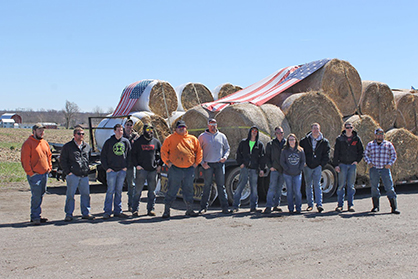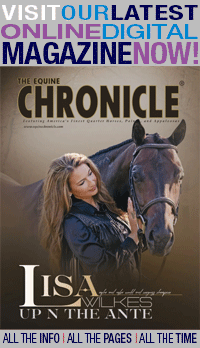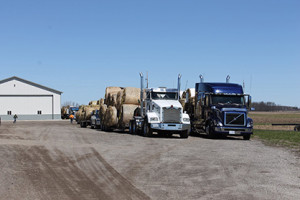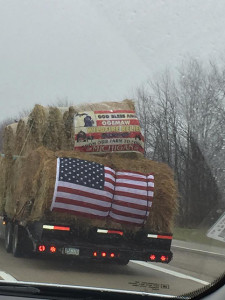God Made a Farmer- Convoys of Supplies Head to Those Devastated by March Fires

Lynn and Nate Kamps with the convoy crew all loaded up and ready to truck. Photo courtesy of Lynn Kamps.
By: Rachel Kooiker
“And on the eighth day, God looked down on his planned paradise and said, ‘I need a caretaker.’ So God made a farmer.”
Chances are you remember the 2009 Ram Truck commercial that went viral because of its stirring use of Paul Harvey’s speech, “God Made A Farmer.” Harvey’s eloquent prose illuminated a truth long known to those who toil among the amber waves of grain. Farmers are our nation’s caretakers.
This past March, wildfires tore through parts of the Oklahoma panhandle, northern Texas, western Kansas, and portions of Colorado. Livelihoods were devoured in minutes by flames that moved at speeds of up to 70 miles per hour.
Hot, dry weather conditions coupled with strong winds propelled the blaze through some of the nation’s largest cattle-ranching areas. By the third week of March, the fires had killed at least seven people, hundreds of thousands of cattle and livestock animals, including horses, and burned well over 2 million acres of land. The largest group of fires, known as the Northwest Oklahoma Complex fires, encompassed the border between Oklahoma and Kansas. This particular group of fires decimated over 1,200 square miles of land. The fires in Kansas were the largest in the state’s history, according to The New York Times. In Texas, the fires were the third largest the state had ever seen.
Ranchers, who should have been tending to newborn calves, were forced to cull their herds, putting down cows and calves with injuries too great to treat: scorched hides, burned hooves and udders, and smoke-damaged eyes and lungs. The devastation was so great that flatbed trailers could be seen roaming the area piled high with dead cattle.
As the fires roared on through March, most of the world went about business as usual, but not our farmers. After all, they are our nation’s caretakers.
Many farmers in Michigan couldn’t sleep thinking about the devastation their brothers and sisters were facing. So they got up early, tended their own stock and plowed their own fields, before heading to town to collected much needed supplies. Just like in the horse industry, when something happens to one, it happens to us all. Word spread quickly and soon multiple convoys from the Upper to Lower Peninsula were heading out in waves with hay, grain, fencing supplies, and medical equipment that were often purchased out of pocket. Farmers from many midwestern states joined in the efforts too, but a huge wave of support and aid has been coming from the agricultural community in Michigan.
You may know her best as a trainer and judge, but AQHA Professional Horseman Kelly Boles Chapman has deep ties to the agricultural community. She earned her Bachelor’s degree in Agriculture and Natural Resources Communications at Michigan State University, and she also holds a Masters degree with a focus in Youth Equine and Livestock Educational Development from Virginia Tech. In addition, Chapman and her husband own a commercial and purebred cattle operation. Chapman was en route to a spring break vacation with her family when she was moved by the sight of a convoy of farmers heading to Kansas. “Seeing these Michigan farmers, who so selflessly took feed and supplies, on their own time and gas, to help out others, made me incredibly proud,” she says.
Nate and Lynn Kamps of West Michigan were involved in the aid efforts. They also have close ties to the horse community. Lynn is a 4-H leader, open show judge, equestrian team coach, and competes on local circuits with PtHA World Champion gelding Gentlemens Lad. Nate traveled with a small group that made the trek from West Michigan to Kansas on April 7th. This convoy of eight rigs delivered hay and feed to a farmer in Meade, KS. who lost more than 55% of his cattle in the fire. “When we got there, you could see the exhaustion on his face,” Kamps says. “He also told us that all of the feed we delivered would last him just a day and a half.”
Kamps says the gravity of the act didn’t hit him until a 70-year-old Marine veteran approached him while the group had stopped to adjust their load. “He walked up to me, shook my hand, and told me that we were heroes. That just hit me.”
We must keep in mind that what happens to one, happens to us all and, from that lesson, remember to answer any call for help we can, big or small. In the words of Senator Pat Roberts of Kansas, “The America some view as idealistic, where we take care of our neighbors in need, is not a thing of the past. It is in those trucks hauling hay.”
Or, more accurately, it’s in the American farmer doing what God made farmers to do: baling families together with the bonds of kindness, empathy, and selfless compassion.












